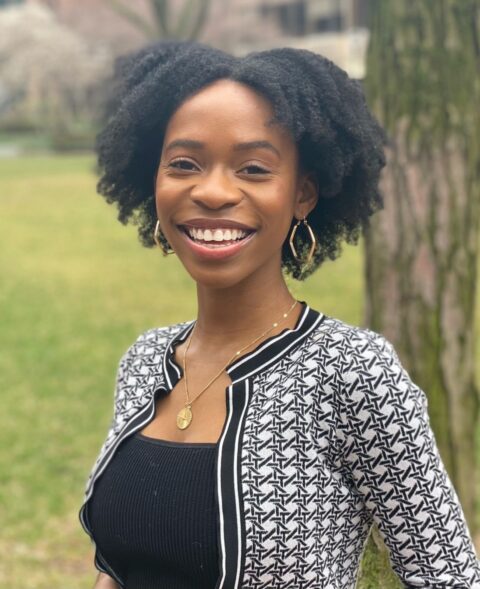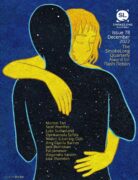Bodies of water (rivers and oceans) seem to be a theme in this story. Moreover, gain and loss ebb and flow in this piece similarly to tides. Gaining pale men begets the loss of generational stories, remembering involves loss of life for both the narrator and Uzoma. Was this ebbing and flowing intentional or did it evolve organically? What, if anything, would you say the water is a metaphor for?
An intentional theme when approaching this piece was movement—whether chosen or forced. The ebbing and flowing as a form of movement was not a conscious choice but evolved organically. Throughout the story, these characters endure movement when their status quo is disrupted. They either embrace movement (how both Uzoma and the narrator move from the physical world to the Spirit realm) or are forced into movement (how grief moves the narrator into isolation, how the narrator is moved from their home to a foreign place). And like you mention, there is a give and take with movement. Moving towards something means moving away from something else, and vice versa. I would say, just like the slave ship, water itself is a vehicle through which the characters move. But unlike the slave ship, water gives the characters agency, providing them an avenue to decide how and when they want to move.
The narrator shifts their mindset at the end of this piece, from lamenting death to embracing it or “remembering.” What do you think facilitates this change of heart?
So, this piece is inspired by Igbo Landing—the mass suicide site of Nigerian captives en route to the United States. The Igbo Landing story has been retold over time—from the Flying Africans folktale, Beyoncé’s “Love Drought” music video, to Toni Morrison’s Song of Solomon. One variation of the story that has always stuck with me describes how the Igbos sang as they drowned, chanting, “The water Spirit brought us. The water Spirit will take us home.” With that in mind, I wouldn’t say the narrator necessarily embraced death itself. I think, instead, they finally caught a glimpse of what they believed could come after death—home, remembrance, flight—and this is what they embraced.
Who is the boy by the river and, later, the young man on the slave ship whose features appear to be lifted from the narrator’s own and/or what does he represent? Is it meant to be the narrator or their would-be child with Uzoma?
I really like the idea of the boy and, later, the young man as the would-be child of Uzoma and the narrator. I never identified the gender of the narrator, so that is a great reading. I actually wrote the boy as the narrator’s would-be child, not with Uzoma, but with one of the pale men. In African stories, an elder—typically a matriarch—is the person who guides from the Spirit realm. So, I thought it would be interesting to flip that typical storytelling structure. It’s also a redemption story of sorts. Who the narrator references as a source of “shame” in II., eventually guides them to “remembrance” in IV.
I love that this story has a narrator who dies at the end and it’s framed as a happy ending (or at least not a sad one). It’s definitely not how I was raised to view death and I think there is something incredibly beautiful and freeing about this outlook. Was it easy for you to view death as a happy ending, same as the narrator, or was framing the story in such a way difficult?
I’m glad you feel this way. It was definitely more of a risk for me as a writer, but I’ve always loved reading and hearing stories that have a bittersweet or differently happy ending. In Igbo culture, death is not the end of a life, but the beginning of a different phase of life. This goes back to what I mentioned about the characters’ movement from the physical world to the Spirit realm. I read a research paper by Dr. Michael Muonwe, who wrote about Igbo traditional beliefs on death and the afterlife. In his work, he references an Igbo proverb: enu uwa bu olili, onye nosia o naba—meaning the world is for tourism; a visitor must go home. So, I agree—there is something incredibly beautiful and freeing about this outlook.
Labor and rest both make frequent appearances in this story. Labor is used by the narrator as an unhealthy coping mechanism, an escape from grief. And forced labor seems the inevitable conclusion of their journey across the ocean on the slave ship. Meanwhile, rest and remembering seem to go hand in hand as the narrator says, “… the hour the ship docked, I was bathing in the river, finding rest, seeking remembrance.” Do you think the narrator would agree with Tricia Hersey (founder and creator of the Nap Ministry), who argues that rest is an act of resistance for Black people?
I really love that you mention Tricia Hersey. I’ve been following the Nap Ministry since the pandemic, and her work inspired me to completely reimagine my approach to rest. The narrator, as well as Uzoma, would agree that rest is an act of resistance. This is perhaps why Tricia’s work gained even more traction during the pandemic. Of course, the pandemic brought immense pain and suffering, even in my life. Though, amid considerable loss and distress, people were able to remember who they once were—picking up hobbies they loved as children, connecting with old friends, finding space for self-care. I’m learning that it is in times of great sorrow that rest is most crucial. When the tides of grief overwhelm us, this is when it is most important to remember, to tap into memories—those we’ve created or even those we’ve inherited.



 The core workshop of SmokeLong Fitness is all in writing, so you can take part from anywhere at anytime. We are excited about creating a supportive, consistent and structured environment for flash writers to work on their craft in a community. We are thrilled and proud to say that our workshop participants have won, placed, or been listed in every major flash competition. Community works.
The core workshop of SmokeLong Fitness is all in writing, so you can take part from anywhere at anytime. We are excited about creating a supportive, consistent and structured environment for flash writers to work on their craft in a community. We are thrilled and proud to say that our workshop participants have won, placed, or been listed in every major flash competition. Community works.